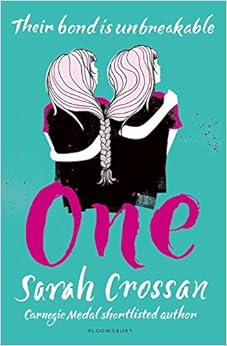by Dulcie Langley
One
is
a powerfully emotive and uniquely original novel, encompassing many different
complex themes and emotions such as first love, loss, identity and the question
of whether everyone really is born with a soulmate.
The book explores the lives of twins Grace and
Tippi. But not just twins – conjoined twins. Bound at the hip, these
extraordinary sisters share a bond unlike any other; they are two entirely separate
individuals yet at the same time completely in sync with each other. Two
people, with different hopes and dreams, but sharing one body.
But sharing this uniquely unbreakable bond is
inevitably followed by physical as well as emotional difficulties, suffered not
by just the sisters themselves but their surrounding family, from finding the
money to pay countless hospital bills from their treatment to braving the
disdainful expressions and snide comments they receive for their differences.
When their financial situation worsens, the twins
are forced from their protected and secure home-schooled lifestyle to the
unforgiving and judgemental world of a public school. Suddenly, there is
nowhere to hide from the curious enquiries and blunt remarks from other
students.
But this is just the beginning hurdle for the girls.
For around the corner lies an unexpected choice – the hardest of their lives. A
decision they never imagined they would have to make…
This book was unlike anything I had never read
before. I enjoyed the effect of the original layout – the story was written in
simple verse, and this really enhanced the delivery of the book. A poem formed
each chapter, and as such I often flicked back to chapters of particular
poignancy and significance in the story. Some of these poems were also very
powerful not just with the One back
story yet standing alone too. I had never read a young adult novel that adopted
this structure before, but it was extremely effective, especially in such an
intensely emotional book as One.
Pinpointing and highlighting particular phrases in each line of verse instead
of simple long sentences, I believe, made the impact of each word in Sarah
Crossan’s thought-provoking descriptions even more important.
Crossan is undoubtedly
an incredibly talented writer. Whilst she does not have personal experience of
Grace and Tippi’s struggles her heart-wrenching accounts are told with such
honesty and understanding of their situation it gives a perfect justification
of what they are going through, and makes their emotions tangible to the
audience through a sort of ‘bare’ approach. Whilst the language is not particularly
complex, this makes it more relatable to young readers, making it easier to
empathise with the characters. Because whilst the story deals with some
heart-breaking themes and ideas it also features everyday problems experienced
by all young adults, adding to its appeal to the target audience, like secret crushes
and attempting to fit in. But the problems that come with being conjoined twins
mean that these everyday issues cannot be considered ‘everyday’ with the same
ease. For example, the romance slipped into the story. It is deeply moving when
Grace has to swallow the realisation that whilst she and Tippi can just about
manage physical actions like getting dressed, with some difficulty admittedly,
she can never allow herself to fall in love.
I also thought it was very poignant to just tell the
story from one twin’s perspective, to continue to communicate the idea that
these girls are separate yet at once a single union. Our narrator Grace
recognises herself as the least confident of the pair – at one stage describing
herself as a parasite to Tippi. Without wishing to give too much away, the
ending especially brought out this idea of two lives being uniquely interlinked,
when Grace realises that the identity she seemed to have fought to earn herself
throughout her whole life with Tippi would mean nothing without her sister’s
presence.
My only criticism lies in the verse layout – whilst
I thought this worked positively, it meant that the story was over quite
quickly. I would have liked more time to flesh out each character’s personality
and perhaps add more specific details about the day to day domestic issues of
the twins’ lives as well as the psychological side of the story – perhaps
leaving out these sorts of petty daily issues is effective in that it
demonstrates the fact that the Grace and Tippi do not see tasks such as how
they get dressed, for example, as significant but just their version of
‘normal’.
I would thoroughly recommend this book to any senior
school pupil – but be prepared for some tear-jerking scenes! I would advise any
reader to have a hanky at the ready when reading this book.
I would definitely rate this book five stars.

Comments
Post a Comment
Comments with names are more likely to be published.